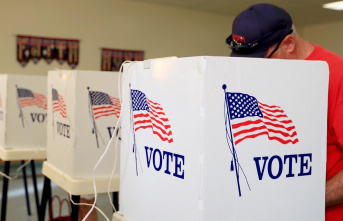The dice have been cast, the constitution has been amended, and the rest is a mere formality: On Sunday, the Communist Party (CP) delegates will officially confirm Xi Jinping's third term as general secretary. With this, Xi will most likely advance from absolute ruler for life and finally follow in the footsteps of state founder Mao Tsetung. He had already paved the way for this in 2018, when he abolished the limit on the head of state's term of office to two mandates. It is the culmination of an unprecedented transformation from a marginal party member to the undisputed leader of what will soon be the most powerful economy on the planet.
Under the gaze of the 2,300 delegates, head of government Li Keqiang and head of parliament Li Zhanshu, something like the last adversaries of the "Outstanding Leader", announced their withdrawal. In the course of his enthronement – there is no other way to describe what was initiated in Beijing on Saturday – the 69-year-old Xi will present the new members of his leadership team, the Standing Committee, on Sunday. As expected, Xi will heave close followers into the vacancies. By filling the seven seats of the Standing Committee, the real center of power, with Loyalists, he nips any future opposition to his policies in the bud. "China has entered a new era of maximum Xi," Neil Thomas, a Chinese policy analyst at Eurasia Group, told the New York Times (NYT).
The fact that Li Keqiang, the second most powerful man in the country, is also leaving his post speaks volumes. Li was seen as a kind of final breakwater in the face of Xi's ever-increasing power. "There's been a lot of talk about the prime minister as a savior -- that these officials could stick around and push back Xi, but obviously that's not going to happen," said Christopher Johnson, the president of the China Strategies Group and a former CIA analyst at the NYT.
Also symbolic was the unsightly end of the 79-year-old former head of state and party leader Hu Jintao. The frail-looking 79-year-old was led off the podium in the Great Hall of the People by two stewards, apparently against his will, shortly before the constitutional changes. Hu, who handed over the post of secretary-general to Xi in 2012 and was not necessarily seen as his supporter, represented the "old" model designed to prevent a new Mao. A model that the People's Republic is finally turning its back on this weekend.
Now it is clear: Xi is China's present and future. He could even go a step further and be appointed party leader, a post not held since Mao. In that case, according to "Sky News", he could give up the then unnecessary post of Secretary General and leave it to a younger favorite. It is also possible that he anchors his personal ideology, the "Xi Jinping Thought," in the constitution. No Chinese leader since Mao has dared to do that either. Already, Xi's policies, aptly titled "Xi Jinping Thought for Socialism with Chinese Characteristics in a New Era," are being taught in elementary schools. Neither would change much in practice, but the symbolic meaning would be enormous.
When Xi took over as secretary-general in 2012, very few people knew his name. Those who had heard of him hoped he would take a liberal course similar to that of his father Zhongxun, who had served as vice premier. You should be disappointed.
Today, ten years later, Xi Jinping is the most powerful Chinese head of government since Mao and, given his almost absolute control over the state apparatus, probably the most powerful man in the world. According to the British "Guardian", his father had campaigned for a law to protect freedom of expression. But Xi Sr. fell out of favor with the Mao regime, turning the life of his previously privileged son upside down and shaping his ideology forever. "His father was a liberal, but he was imprisoned. To avoid his father's fate, Xi learned to do things differently," the newspaper quoted an expert as saying.
When Mao died in 1976, the party instituted a system of collective leadership to prevent all power ever again falling into the hands of a single man. It must be seen as an irony of history that the son of a functionary who lost everything under Mao is about to take over the legacy of the very same dictator.
Everything Xi Jinping has done over the past decade has served not only to secure his power, but to expand it. To do this, he uncompromisingly eliminated potential rivals and suppressed the slightest divergences of opinion. His coronation this weekend is the culmination of his policy of political and economic purge. "What strikes me most about Xi Jinping is his Stalinist way of governing: he uses his apparatus to purge the party, [emphasizes] the unified leadership of the party, and returns to true party dictatorship," says Jean-Philippe Béja, emeritus research professor at Sciences Po in Paris the "Guardian". According to the US news channel CNN, since he came to power, 4.6 million officials have been investigated – neither low-ranking officials (“flies”) nor high-ranking decision-makers (“tigers”) were immune.
By cementing his power, Xi is doing the West, which he so hates, a favor, believes the US trade magazine Foreign Policy. At least the US and its allies now know where they stand with China. Because over the past 25 years, the leadership changes in Beijing have taken place with the precision of a Swiss watch. "After each reshuffle, Western scholars would spend years analyzing public speeches and essays in party newspapers," Foreign Policy said. By the time the West had even remotely understood the respective government philosophy, it was already the turn of the next party leader. In short: With Xi's foreseeable lifetime rule, China is finally predictable again. But that has its price.
The last remnants of political pluralism have given way to a centralized cult of personality. The free market economy, the key to China's transformation from poor agricultural state to economic superpower, must bow to the increasing influence of the state. "The command economy is coming back. But not the Marxist social idea," says China expert Steve Tsang in an interview with "Spiegel". The fact that the CP is throwing itself at Xi's feet this weekend is the result of a massive process of change. Because Xi not only promised, but also delivered.
The unspoken deal: economic prosperity and geopolitical power in exchange for political and individual freedom. His vision of the "great rejuvenation" has borne rich fruit - at a high price. This became particularly clear with the onset of the corona pandemic, which provided a suitable pretext for introducing all-encompassing, high-tech surveillance. To date, the management has not moved a millimeter from this "zero Covid strategy".
It's also no secret that Xi is not content with China alone. In fact, China has been following its "five principles" for decades when it comes to foreign policy, which reads: "mutual respect for sovereignty and territorial integrity, mutual non-aggression, non-interference in each other's internal affairs, equality and mutual benefit, and peaceful coexistence." But Xi has perfected the art of seduction. With the billions invested in his "New Silk Road", his Middle Kingdom has bought influence in every corner of the world and made resource-rich but poor countries around the world dependent.
At the same time, Xi made a lot of effort, especially at the beginning of his reign, to present China as a reliable partner in matters of trade and security policy. In the years that followed, however, it became increasingly clear what he was actually about: he built up an ideology tailored to his needs, which reached its peak this Saturday when he called on the party to join him "in thinking, politics and acting". to stay in step. Like his power-political role model Mao, he has succeeded in subjecting an entire state to his personality cult: it is the beginning of Xiism.
Sources: "New York Times"; "Foreign Policy"; "Guardians"; "Sky News"; with material from the news agencies dpa and AFP












